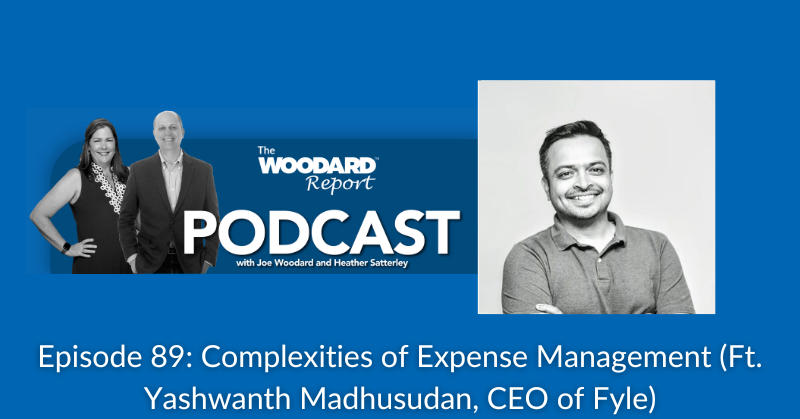Managing financials has become more complex than ever. With various spending methods, it can be exceedingly challenging to keep track of expenses in real-time.
This was the focal point of the latest episode of the Woodard Report podcast, in which Joe Woodard and Heather Satterley welcomed Yashwanth (Yash) Madhusudan, CEO and founder of Fyle, to discuss how businesses can tame the "tiger by the tail" that is expense management.
The evolution of expense management
Woodard opened the discussion by reminiscing about the days of check stubs, contrasting it with the current landscape where clients spend money in myriad ways. The advent of digital transactions has made financial tracking both more accessible and more complicated. This shift has increased the need for real-time financial oversight, posing a significant challenge for accountants and bookkeepers.
“With the variety of other ways that our clients are spending money, we do have multiple tigers by the tail, and it's more important than ever,” Woodard said. “We are now the tiger tamers, and the expectation of the client is that things will touch their financials in real-time, yet they've inadvertently made it more complicated for us.”
Madhusudan explained the intricacies of credit card usage in businesses, noting the various types of cards—small business, corporate, personal, and co-branded cards—and the rewards they offer. He highlighted that business owners often juggle multiple cards to maximize rewards, such as points or cashback, which can lead to a complicated financial landscape.
Despite the rewards, this practice introduces complexity into expense management. Business owners might find themselves managing numerous cards not because they need them all, but to take advantage of specific benefits offered by each card.
The need for efficient expense management
The crux of the problem, as Madhusudan pointed out, is not the number of cards but the need for a better way to manage them. He shared an anecdote about a construction company CEO who emphasized the need for seamless data integration into accounting systems. “What we need is a better way to just get that data into our accounting without making my accountant go mad,” Madhusudan said.
Card agnosticism
Madhusudan explained that Fyle's approach to solving this problem is through "card agnosticism," allowing businesses to use any credit card while ensuring real-time connectivity and data integration, avoiding the pitfalls of traditional bank feeds like frequent disconnections and the necessity for constant maintenance.
Fyle’s card agnosticism approach involves directly integrating card networks rather than relying on bank feeds. Madhusudan explained that this system allows businesses to continue using their preferred credit cards while benefiting from real-time data connectivity and rewards optimization.
Madhusudan also emphasized that the right tool automates the process, not just by using software but by ensuring the software fits seamlessly into existing workflows, allowing accountants to focus on more critical tasks instead of fighting with the tools that are supposed to make their lives easier.
Spend management as a service
Woodard discussed the concept of "Spend Management as a Service," an advanced layer of controllership services that goes beyond traditional bookkeeping. This service includes establishing and enforcing spend policies, monitoring expenses in real-time, and ensuring compliance with company policies.
Madhusudan agreed, noting that Fyle’s platform can integrate with budgets and provide visibility into spending patterns. This integration allows businesses to manage their expenses proactively, preventing overspending and ensuring financial discipline.
Woodard emphasized the transformative potential of Spend Management as a Service. By incorporating real-time payment information into a broader financial strategy, businesses can move beyond mere record-keeping to actively managing and optimizing their spending.
To hear more of this conversation, check out The Woodard Report Podcast below!
Listen to the podcast episode below:
Follow The Woodard Report Podcast on your favorite podcast platform.
Sponsored Content: This article is generously brought to you by one of our valued sponsors. Their support enables us to continue delivering expert insights and the latest industry trends to our dedicated community of accounting professionals.
.png?width=150&height=63&name=TWRlogo-regmark_blueblack%20(1).png)
.png)










Do you have questions about this article? Email us and let us know > info@woodard.com
Comments: